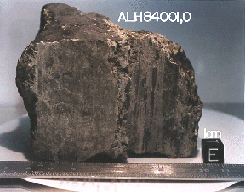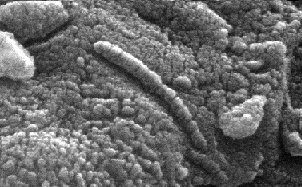Martian Life found on Earth????
Creationist Response to Announcement from NASA Of
evidence of fossilized microscopic life on Mars, found in Meteorite on
Earth.
by Wayne Spencer
Following is a summary based on comments from contributors to CRSNet, many
of which have advanced degrees in the sciences. All areChristians and young
earth creationists. First, the announcement. "CRS"stands for Creation Research
Society, an organization of Christian Creationists in the sciences, over
600 of which have graduate degrees in some field of science.


On left--Meteorite ALH84001 found in Antarctica. On right--alleged life
form found in a crack in the meteorite.
There are a few examples of meteorites discovered on Earth which match
the composition rocks on Mars. It is believed that these rockswere ejected
to escape velocity by a large impact on Mars and in time found their way
to Earth and were captured by Earth's gravity. Many scientists have accepted
today that this is possible. I would agree that it is possible since Mars
does possess evidence of extremely large impacts. The controversial new
finding is regarding one of these meteorites. The meteorite in question
is believed to be 13,000 years in age. Certain microscopic structures were
found in the meteorite which resemble structures found in Earth rocks which
are believed to be microscopic fossils of ancient microorganisms. It has
been reported that the largest of these possible fossil structures is less
than 1/100 th the diameter of the human hair. This has been said to be
smaller than any known life forms or fossil life forms on Earth.
It is sometimes compared to something referred to as "nanobacteria" from
Earth, but many microbiologists doubt that nanobacteria really exist. The
object found in the above meteorite may be too small for it to be physically
possible for it to be a one-celled life form. Even a one-celled life form
requires a certain minimum size. Even if a life form could be of
this size, there are other problems with drawing the conclusion that this
meteorite contains remains of life FROM MARS.
The meteorite itself is believed to be over 3 Billion years in age. Some
planetary scientistsbelieve that at that time Mars possessed a thicker
atmosphere which allowed for liquid water on the surface. I would say this
is also possible, though I do not accept their age figures (neither 3 billion
nor 13,000). Certain organic compounds and certain iron compounds
have been found in the meteorite that is considered by some to be evidence
of life. The iron compounds could be the waste products of bacteria, or
it is possible they have another origin unrelated to life. The organic
compounds have been found with microfossils found on Earth.
What are the assumptions involved in claiming that this find is evidence
of life having evolved on Mars? First, it assumes that the rock is indeed
from Mars. It's composition makes this a good possibility, but it
cannot be proven to be from Mars. It is not impossible that the object
was ejected from Earth in the past when there was an impact on Earth,and
it eventually fell back to Earth. Secondly, there is the assumption
that when the object left Mars, the organic compounds and "fossil structures"
were present inside. This also cannot be proven, but it is a possibility.
Even if it was life and was from the surface of Mars that still is not
evidence that it evolved on Mars, since it is quite possible that living
bacteria that are common in Earth's upper atmosphere could drift accross
space and find their way to Mars. It is also possible, as evolutionists
have acknowledged, that a rock could be ejected from Earth long ago by
a large impact, it could orbit the Sun for some years and then be captured
by Mars' gravity. Then it could be ejected again by a Mars impact and could
find its wayback to Earth (all amazing accidents). Personally, I
find this very very unlikely. One planet-to-planet hop by virtue
of a large impact I might believe, but two such hops by the same rock is
just to much. A third assumption is that the structures and chemicals
found are indeed fossils of microbial life and have no other origin from
nonliving processes. Scientists have stated that both the organic compounds
and the iron compounds found could have other natural origins. The chemicals
in question go by the name PAH, for polycyclic aromatic hydrocarbons. The
type of PAH compounds found in this object are of a type that is known
to exist in space and is not normally interpreted to be of biological origin.
A Washington Times article refered to a NASA paleobiologist as saying that
the chemicals found were not indicators of life, and that the conclusion
that they were evidence of life was premature and probably wrong.
What are the motivations behind this new claim from evolutionary scientists?
We must understand that there is a great desire on the part of the scientific
establishment to use this to promote the idea of evolution, to convice
people that life can evolve elsewhere and therefore we are not alone in
the universe. But, we have never been alone in the universe because
we were created (not by accident) by an infinite transcendent God, who
has made us to know Him in a personal way. We must look to Christ
for answers, not to science itself nor to some hypothetical extraterrestrial
intelligence that may not exist. Evidence for life on another planet
would not negate any of the scientific problems with evolution, the evidence
supporting the creation view, nor would it lessen the weight of authority
or the trustworthiness of the Christian Scriptures. But I feel we
should be sceptical about claims of evidence for extraterrestrial life.
When the Viking spacecraft tested the soil on Mars it detected chemicals
that made scientists initially react with bold claims of evidence of life.
Then further analysis made it clear that they had only discovered some
interesting and unique soil chemistry. Time could prove the recent
claims to be much ado about nothing. NASA may be attempting to use
this as a ploy to generate public interest so they can get more funding
in future budgets.
What are some possible problems with the claim that this find is evidence
of life on Mars? One significant one is that the structures and compounds
found lie in a crack in the rock. This might mean that a microorganism
could have entered the rock after arriving at Earth. There is also another
study of the meteorites which analyzed the amounts of certain sulfur isotopes
in the rock. These isotopes, S-32 and S-34, are considered indicators
of life in that the ratio of two isotopes changes in the presence of biological
activity. But the study found no evidence of life forms from this
sulfur ratio. So, what are the possibilities, from a creation perspective?
1) Its not fossil life at all, but just Martian chemistry, in which case
we might respond as some abortionists have responded to prolifers objecting
to killing an unborn baby, "It's nothing but a blob, its not life."
2) It is fossil life but it was contaminated by Earth life after arrival
on Earth. After all, it has supposedly been on Earth for 13,000 years.
In addition, it is not impossible that bacteria could have got into the
rock while in space since microorganisms from Earth could make their way
into space and even survive the cold vacuum of space. It is also
possible that a microorganism from high in Earth's atmosphere could be
responsible. 3) It is possible that the rock is not from Mars at
all, though I suspect it is from Mars. Some of the primary "evidence"
of Martian origin is from the amount of Argon and other gases present in
it, compared to Viking measurements in 1976. New evidence from the
Mars Pathfinder Mission provides more information on the composition of
Martian rocks compared to these SNC meteorites and compared to Earth rocks.
It is not at all certain, from the new data, if SNC meteorites are from
Mars, but it is possible. We are apparently to assume (thinking like
an evolutionist) that the amount of Argon in Mars'atmosphere has not changed
for over 3 billion years, in spite of the abundant evidence of catastrophic
volcanism and impacts in the history of Mars.
There are several realistic possibilities on the origin of these objects.
We should keep this in mind as we hear of the various news reports.
Nothing about this finding should be considered to be evidence of evolution.
Regardless of which planet or the conditions suggested by scientific models
under which life would have evolved, the origin of life from chemicals
remains implausible. "In the beginning God..." is still the best explanation.
Wayne Spencer M.S. Physics
Creation Education Materials, P.O. Box 153402, Irving, TX 75015-3402
"For in six days . . . ." Exodus 20:11